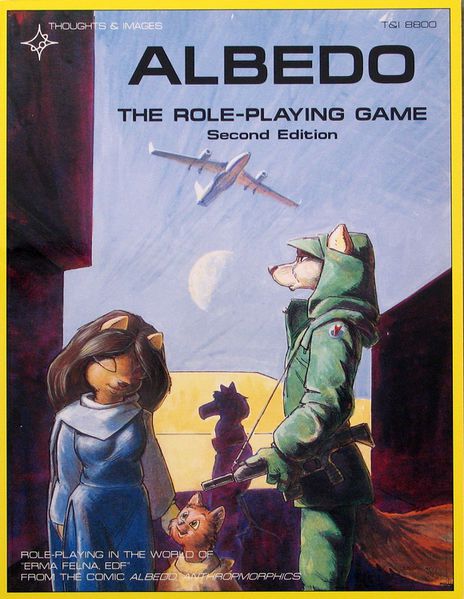Science fiction is a vast squishy thing spread throughout all sorts of media and culture/subculture. Got it. I wanted to examine its content in two pretty-specialized media: mainstream television series and table-top role-playing. You’ll see three dialogues: first with Ángel, then Ivan, and finally Moreno. I’m first to admit, the result is a mess: not much more than dialogue, spitballing, trying to stay on track, with a couple of difficult variables in play. But I think what emerged is interesting.
Fortunately, the plan was not to survey it (or them) all, because if it were, it’d be a miserable failure. A couple of titles and topics get over-represented, more than a few get dropped or missed. Traveller and Shadowrun are both mentioned but not acknowledged or well-considered for their powerful defining presence. Gamma World’s legacy, e.g. the Mutant franchise, is woefully under-served. I should have reflected on my experience with the Decipher version of Mutant Chronicles. Eclipse Phase needs to be in there. I had it in mind to talk about time travel shows more, as I finally may have figured out the basics of playing Continuum.
Why did I set this question in place, in this way? Lots of big reasons, to discuss in the comments if people are interested, but the first answer is the two “hobbies” relation to mainstream culture. Viewing science fiction TV, especially in the habitual and ongoing sense, is no longer hobby or fringe or a bit weird, not even a little. Table-top role-playing is all of those things. They both draw upon the larger, diffuse, and incredibly rich range of science fiction in general … I’m interested in their areas of overlap and areas of distinct discontinuity. Especially since the subset topic of games licensed from shows adds more discontinuity rather than less.
With that in mind, I’d also like to develop the triple-variable problem that Ángel and I distracted ourselves from, the interplay among enjoyment, fandom, and consumption.


5 responses to “Monday Lab 4: SFTV RPG”
Sci-Fi media translation to RPGs
That effect you’re describing
That effect you're describing is tied to a lot of my frustration with fandom. I have very little personal sympathy for the "hit" you're talking about. My experiences as a young mid-70s enthusiast for Star Trek, Planet of the Apes, and Marvel Comics taught me the opposite lesson, and have perhaps made me cynical enough to say that the "hit" is far more based on consumer-spending hysteria and the purchase of identity than on anything to do with actually enjoying the material.
We broke open the topic a little in the seminar – that science fiction role-playing can be a venue for fanfic rather than a medium for making something.
That doesn't track to using a canonical and beloved setting as automatically as one might think. A hell of a lot of great work began as casual, homage, or totally self-indulgent musing regarding something someone liked. The question is whether it catches fire along the way, or as I like to put it, stops relying on reminding the participants how much they liked the source material, and more-or-less demands to be liked for itself. It doesn't even have to be particularly original relative to the inspiring material, not in the usual terms of its exact trappings. It simply has to be good in some way of its own that you can find here rather than "back there."
So I'm not talking about avoiding what one loves in science fiction (in this case, SF TV), but rather, what one does with that love, and whether the medium this site is dedicated to is being considered, by its own practitioners, as a lesser form.
We should do a video conversation about Farscape in particular, which I also love greatly. I strongly share your fears about role-playing it – allowing for whether they'd manifest as some aspect of the game design (as I talked about for The Babylon Project) or as lowered, limited expectations among the players regardless of what the game provided. Either way would be a real letdown or agony.
I would love to do a Farscape
I would love to do a Farscape talk
As far as newer science fiction games go, I will go ahead and mention Sotakarjut by Miska Fredman, https://www.ironspine.com/sotakarjut/ , from 2017. Sure, you are playing a super soldier with all that implies, but your suppressed memories will also come back as play proceeds. The game also has narrative rights and a definite ending point. I have not gotten the opportunity to play the game, unfortunately, so I do not know how well all of the moving parts work in actual play.
Thanks Tommi!